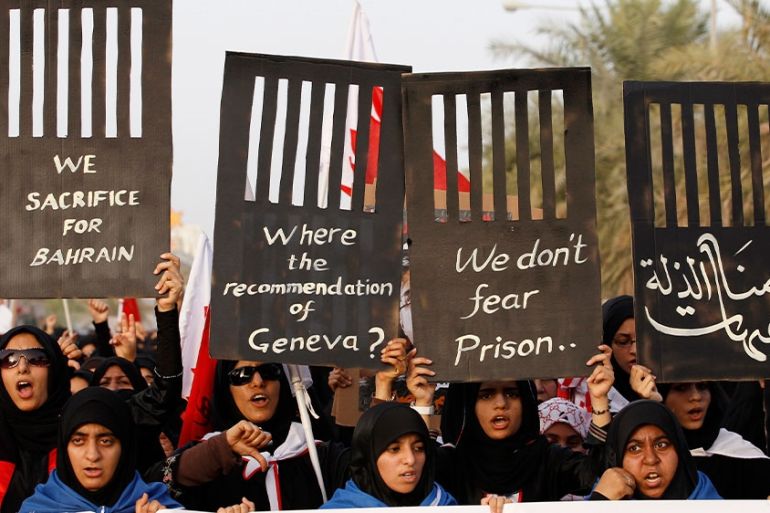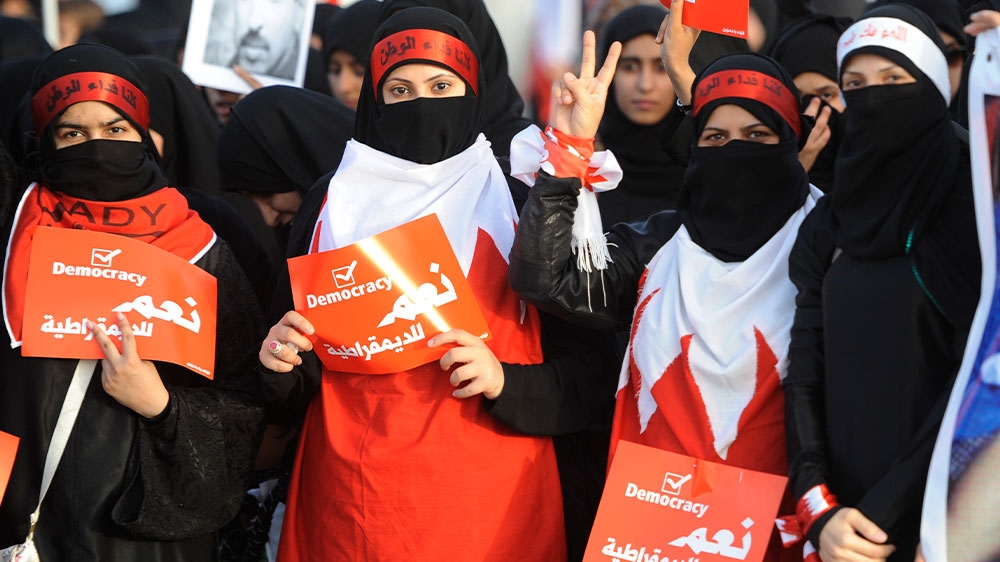Rights groups slam Bahrain over detention of female activists
Recent report finds nine women were arrested without search warrants and were subjected to physical and sexual assaults.

Washington, DC – Rights groups on Tuesday slammed the Bahraini government for what they say is the systematic targeting of female political activists and their mistreatment in prisons.
A recent report titled, Breaking the Silence: Bahraini Women Political Prisoners Expose Systemic Abuses, outlines the cases of nine former and current female prisoners in Bahrain throughout the process of their arrests and trials, as well as the conditions of their detentions. The report was formally launched last month, and was the subject of a Washington, DC, event on Capitol Hill on Tuesday.
Keep reading
list of 3 itemsBahrain strips over 100 of nationality on ‘terror’ charges
‘Rogue state’: Bahrain dissidents seek action against government
The report, conducted by the London based Bahrain Institute for Rights and Democracy (BIRD) and Americans for Democracy & Human Rights in Bahrain (ADHRB) found that the women were arrested without search warrants and were subjected to physical, psychological and sexual assaults during interrogation. Coerced confessions were used as evidence to convict them.
The 138-page report found that six of the women were convicted under terrorism-related charges. Bridget Quitter, Legal Officer at ADHRB said the women were targeted as part of a concerted state effort to crack down on free speech.
“These women were targeted for their opinions or those of their relatives,” Bridget Quitter said during the panel event in Washington, DC.
“And they were subjected to rights violations from the moment of their arrest, through their interrogation and torture, unfair trials and detention in conditions which fail to meet international standards,” Quitter said.
Of the nine women, three – Hajer Mansoor, Medina Alia and Zakeya AlBarboori – are still detained in Isa Town women’s prison, where, according to the report, they continue to be subjected to punitive measures, including lack of access to medical care. The other six women have been released after serving prison sentences.

In 2011, a Shia-led opposition staged an uprising across the country demanding reforms in the Sunni-led kingdom. But the ruling Al Khalifa family has responded by cracking down dissent and sought the help of neighbouring Saudi Arabia, which sent troops to help crush the unrest.
The country of 1.5 million, headquarters of the US Navy’s Fifth Fleet, continued to see sporadic clashes between protesters and security forces. Hundreds have been imprisoned, including politicians and rights activists. Many have fled abroad.
In July, Bahrain executed two activists on terrorism charges – despite pleas by International rights groups and a UN human rights expert who had urged the state not to execute the men, on the grounds that their confessions were obtained through torture, including the use of electric shock and beatings.
Authorities have denied targeting the opposition and say they are protecting national security. Bahrain has also accused Iran of stoking the unrest in the country, an accusation Iran denies.
Quitter said all nine women were threatened with rape and death if they did not provide confessions to the charges against them.
Zainab Marhoom and Ameera Al Qashami said that they were forced to listen to the torture of a relative, and two women, Ebtisam al-Sayegh and Najah Yusuf reported being sexually assaulted by officers, according to the report.
The rights groups called on the government of Bahrain to release the three remaining female prisoners and urged the US to halt arms sales and security cooperation with units involved in the arrest or abuse of activists and human rights defenders, until the country holds an independent and thorough investigation into the allegations of human rights violations.
“The responses we obtained demonstrated that Bahrain has created a system which whitewashes and conceals human rights abuses,” Quitter said.
“The ill-treatment and torture, coercive interrogation tactics, unfair trial, substandard conditions of detention are not merely coincidental, but part of a systematic repression of the Bahraini population.”
Editor’s note: This story has been updated to reflect the report was formally launched in September.